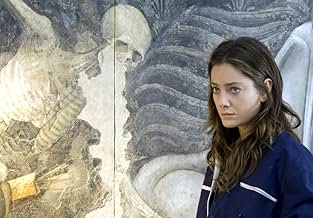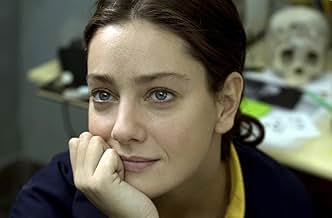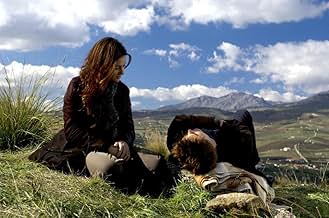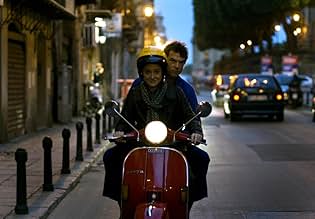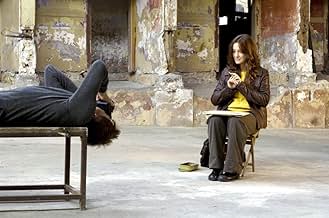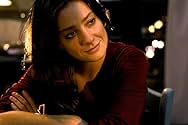IMDb-BEWERTUNG
6,1/10
3263
IHRE BEWERTUNG
Nachdem der wilde Lebensstil eines berühmten jungen deutschen Fotografen ihn beinahe umgebracht hätte, geht er nach Palermo auf Sizilien, um eine Pause zu machen. Kann die schöne Stadt ihm h... Alles lesenNachdem der wilde Lebensstil eines berühmten jungen deutschen Fotografen ihn beinahe umgebracht hätte, geht er nach Palermo auf Sizilien, um eine Pause zu machen. Kann die schöne Stadt ihm helfen, sich zu beruhigen?Nachdem der wilde Lebensstil eines berühmten jungen deutschen Fotografen ihn beinahe umgebracht hätte, geht er nach Palermo auf Sizilien, um eine Pause zu machen. Kann die schöne Stadt ihm helfen, sich zu beruhigen?
- Auszeichnungen
- 1 Gewinn & 2 Nominierungen insgesamt
Handlung
WUSSTEST DU SCHON:
- WissenswertesThe film marks the first time that Director Wenders shot a movie in his hometown, Düsseldorf.
- PatzerIn the scene, when Finn talks with lady photographer, they discuss the age of their cameras. He tells that his Plaubel is twenty years old and she tells that her Leica is 40 years old. Actually she has Leica M7, which slightly differs from older Leica cameras. This camera marketed only in 2002.
- VerbindungenFeatured in Dennis Hopper: Uneasy Rider (2016)
- SoundtracksDream (Song for Finn)
Written by Nick Cave and Warren Ellis
Performed by Grinderman
Published by Mute Song Ltd. 2008
Courtesy of Cave/Ellis 2008
Ausgewählte Rezension
Wenders' supreme quality as an author, to my view, is that he knows that his films are not so much about what images show, but about images themselves. This is his magic, and his curse. This is why i have a shelter in his films, and why so many increasingly misunderstand them (first reviews on this one show it will go to the same package). Wenders knows this, whenever he is making a film, he is reflecting on the nature of image, and how that affects vision, and how vision affects understanding, and how understanding affects meaning, and essence.
Not few times, he addresses directly the theme, and embeds it in the plot of the film. This is such a case. Film about images. People who are about image. People who become the images they fetch. The very first scene makes it clear. It "frames" (how meaningful this word is with Wenders) a landscape, through a window of a building which is in itself all about framing. A pure volume full of square holes, all of them corresponding to a different frame, depending on moment you look, position, distance to the window. This building reflects the personality of the photographer, it is in itself a succession of frames, a closed capsule interlaced with partial views to the outside.
Than we have a story about creating images. A character photographer who loses his soul because he becomes a faker, he forgets the essence, he no longer searches for a truth in the image, instead he creates his own fake truth. Fake Australian skies reflected on S.Paulo's windows, that kind of stuff. The introduction of Milla stands for this, as she is photographed 'artificially', and than transported to the "true" environment. Than the photographer retires, isolated, to a place he feels to be 'true' (a big port, Palermo means).
Now the big things happen in Palermo.
The woman. Her work is to recover images, it is to find the "truth" of images, it is to interpret the vision of somebody else. Those eyes of the painter, starring at the "camera", what he was seeing is what she wants to see. Check the oppositions, check how that fresco is worked on the film: detail versus global sight, understanding versus loosing the essence, long versus short. Check how the time of an image is understood. The woman takes years working on one image, the photographer produces thousands without understanding a single one.
The Death. It's not the death, it's Dennis Hopper, and this matters. To see how Hopper was inserted in this project made the whole thing come clear to me, and it completed a portion of my film life that i now know was incomplete. Hopper is here the designated master framer, the man who observes life, who pulls strings (even though he is only doing his job). He is a superior agent, someone who is beyond and above all that we see. When people look at him, he looks back. He makes the record of all that, we see that, that metaphor of arrows, of "shooting" with a double meaning. So he is framed as much as he is a framer. Now, remember The American Friend. See that film before seeing this one if you can, it may strike you as 2 halves of the same idea, as it stroke me. Check how similar are the characters Hopper performs. There he was also the master framer, the manipulator behind the actions that we had. In fact he was manipulating a "framer" (literaly, a man who created frames for paintings). He used the framer as he provided the main "image". That film, which i consider essential, was all about the same game of images. Now we have an update, on how times changed (and with it changed deeply our relation to images) and how Wenders himself changed. Dennis Hopper is the connection, and his role is pivotal.
Now, i believe that if you want to establish a successful relation to a creator you have to take his works for what they are. It's like loving beyond infatuation, like friendship beyond day to day chat. You have to enjoy the qualities and most important, acknowledge the flaws, and you have to live with that. That's my kind of relation with Wenders. His films in the last 10 years or so have become more and more on the verge of being an intellectual monologue, something you are supposed to sit and listen, and nod affirmatively with you head. That's something i won't tolerate with other filmmakers (Stone, Tarantino), but that i'm willing to put up with Wenders, because it matters to me what he has to say. If, like i did, you are able to put up with discursive dialogs, and the sensation that the man beyond the scenes is leading you to believe that he has the Truth, you may let this change your life. I did.
A side quality you might appreciate is how music shapes the environment, regardless of the scenery. Wenders was also great in understanding this, now he does it with the aid of portable music. The music editing is great
My opinion: 5/5
http://www.7eyes.wordpress.com
Not few times, he addresses directly the theme, and embeds it in the plot of the film. This is such a case. Film about images. People who are about image. People who become the images they fetch. The very first scene makes it clear. It "frames" (how meaningful this word is with Wenders) a landscape, through a window of a building which is in itself all about framing. A pure volume full of square holes, all of them corresponding to a different frame, depending on moment you look, position, distance to the window. This building reflects the personality of the photographer, it is in itself a succession of frames, a closed capsule interlaced with partial views to the outside.
Than we have a story about creating images. A character photographer who loses his soul because he becomes a faker, he forgets the essence, he no longer searches for a truth in the image, instead he creates his own fake truth. Fake Australian skies reflected on S.Paulo's windows, that kind of stuff. The introduction of Milla stands for this, as she is photographed 'artificially', and than transported to the "true" environment. Than the photographer retires, isolated, to a place he feels to be 'true' (a big port, Palermo means).
Now the big things happen in Palermo.
The woman. Her work is to recover images, it is to find the "truth" of images, it is to interpret the vision of somebody else. Those eyes of the painter, starring at the "camera", what he was seeing is what she wants to see. Check the oppositions, check how that fresco is worked on the film: detail versus global sight, understanding versus loosing the essence, long versus short. Check how the time of an image is understood. The woman takes years working on one image, the photographer produces thousands without understanding a single one.
The Death. It's not the death, it's Dennis Hopper, and this matters. To see how Hopper was inserted in this project made the whole thing come clear to me, and it completed a portion of my film life that i now know was incomplete. Hopper is here the designated master framer, the man who observes life, who pulls strings (even though he is only doing his job). He is a superior agent, someone who is beyond and above all that we see. When people look at him, he looks back. He makes the record of all that, we see that, that metaphor of arrows, of "shooting" with a double meaning. So he is framed as much as he is a framer. Now, remember The American Friend. See that film before seeing this one if you can, it may strike you as 2 halves of the same idea, as it stroke me. Check how similar are the characters Hopper performs. There he was also the master framer, the manipulator behind the actions that we had. In fact he was manipulating a "framer" (literaly, a man who created frames for paintings). He used the framer as he provided the main "image". That film, which i consider essential, was all about the same game of images. Now we have an update, on how times changed (and with it changed deeply our relation to images) and how Wenders himself changed. Dennis Hopper is the connection, and his role is pivotal.
Now, i believe that if you want to establish a successful relation to a creator you have to take his works for what they are. It's like loving beyond infatuation, like friendship beyond day to day chat. You have to enjoy the qualities and most important, acknowledge the flaws, and you have to live with that. That's my kind of relation with Wenders. His films in the last 10 years or so have become more and more on the verge of being an intellectual monologue, something you are supposed to sit and listen, and nod affirmatively with you head. That's something i won't tolerate with other filmmakers (Stone, Tarantino), but that i'm willing to put up with Wenders, because it matters to me what he has to say. If, like i did, you are able to put up with discursive dialogs, and the sensation that the man beyond the scenes is leading you to believe that he has the Truth, you may let this change your life. I did.
A side quality you might appreciate is how music shapes the environment, regardless of the scenery. Wenders was also great in understanding this, now he does it with the aid of portable music. The music editing is great
My opinion: 5/5
http://www.7eyes.wordpress.com
Top-Auswahl
Melde dich zum Bewerten an und greife auf die Watchlist für personalisierte Empfehlungen zu.
- How long is Palermo Shooting?Powered by Alexa
Details
- Erscheinungsdatum
- Herkunftsländer
- Offizielle Standorte
- Sprachen
- Auch bekannt als
- Palermo'da yüzleşme
- Drehorte
- Produktionsfirmen
- Weitere beteiligte Unternehmen bei IMDbPro anzeigen
Box Office
- Weltweiter Bruttoertrag
- 580.203 $
- Laufzeit2 Stunden 4 Minuten
- Farbe
- Sound-Mix
- Seitenverhältnis
- 1.85 : 1
Zu dieser Seite beitragen
Bearbeitung vorschlagen oder fehlenden Inhalt hinzufügen

Oberste Lücke
By what name was Palermo Shooting (2008) officially released in Canada in English?
Antwort

